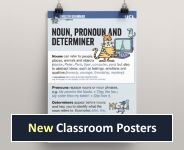Topic: Derivation
These resources cover the ways in which new words can be formed, for example by joining two words together or adding an ending to a word. These processes increase the vocabulary of our language, and an understanding of these processes can be helpful in expanding our personal vocabulary knowledge.
Englicious contains many resources for English language in schools, but the vast majority of them require you to register and log in first. For more information, see What is Englicious?

